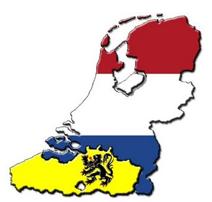
Hey, history never stops. There used to be a Yugoslavia. There used to be a Czechoslovakia. Why can't we say, "There used to be a Belgium."? There is a significant constitutional crisis in Belgium. It boils down to the Dutch speaking Free Market Flemish getting tired of underwriting the Socialists Walloons. As usual, the best summary can be found over at The Brussels Journal.
Belgium is rapidly unraveling. Following the June 10th Belgian general elections, won by Flemish-secessionist parties, the Belgian parties seem unable to form a government coalition.Many parts, if not the balance, of their military is already split up, with what I understand both Dutch and French speaking fighter squadrons and other units. Obviously, Flanders would get the Navy. Being that Walloonia cannot support her welfare state on her own - perhaps she could beg France to take her back?Belgium is a multinational state, the model for the European Union’s efforts to turn Europe into a single multinational state. Belgium is made up of 60% Dutch-speaking, free-market oriented Flemings and 40% French-speaking, predominantly Socialist Walloons. The Belgian Constitution stipulates that the government should consist of 50% Flemings and 50% Walloons. Belgian governments always have to rely on a majority in both Flanders and Wallonia, since major decisions need the support of both parts of the country. In practice this means that 20% of the population (i.e. half of the Walloons) can veto every decision. This has made the Parti Socialiste (PS), the Walloon Socialist Party, the power broker in the country.
The refusal of the PS to reform the welfare state system has caused growing Flemish frustration, and turned what used to be a linguistic conflict into a dispute about economic and welfare policies. While Flanders pays most of Belgium’s taxes the bulk of the money flows to Wallonia. There a welfare-receiving electorate votes for parties which for over three decades have been blocking any attempts at reforming the collapsing welfare system.
...
Last week, Prof. Em. Robert Senelle, one of Belgium’s most prominent constitutionalists, a Flemish Socialist and formerly a teacher of the Belgian Crown Prince, advised the Flemings to annul the Belgian Constitution and solemnly declare Flemish sovereignty. Following this advice Filip Dewinter, the leader of the secessionist Vlaams Belang party, the largest party in the Flemish Regional Parliament, called upon the Flemish Parliament to convene and declare Flanders an independent country.
Yesterday another Flemish constitutionalist, Prof. Paul Van Orshoven said thatTennis Court Oath. The Tennis Court Oath refers to 20 June 1789, when the representatives of France’s third estate [the bourgeoisie] declared themselves to be the true representatives of the nation. “In the spirit of the Tennis Court Oath it is permitted that, even if it violates the Belgian constitutional rules, a simple majority of the Dutch-speakers in the Belgian Chamber of Representatives and the Senate declare to secede.” “intelligent people” should consider a Flemish secession from Belgium. “Because the situation cannot go on where a minority denies the majority its legitimate and democratic aspirations.” Prof. Van Orshoven said that if Flanders secedes this obviously violates the Belgian Constitution, which requires that the Walloons approve of such a decision. He referred, however, to the historical precedent of the
Apart from the media in Belgium and the neighbouring Netherlands, the international papers and broadcasters have hardly reported about the disintegration of the EU’s host country. On Tuesday a survey of the Dutch [Netherlandish] television network RTL4 showed that 77% of the inhabitants of the Netherlands are in favour of the Netherlands and Flanders merging into one country.
In Belgium, an internet poll of Flanders’ largest newspaper, Het Laatste Nieuws, showed 50.9% in favour of reuniting Flanders and the Netherlands. The Flemish provinces were part of the Netherlands until 1831, when the international powers established the Kingdom of Belgium.
No comments:
Post a Comment